- Home
- Brian Hodge
Picking the Bones Page 9
Picking the Bones Read online
Page 9
By now we'd gotten off by ourselves, just the two of us. Liz was still inside, where my wife Sonja was showing her the rest of the house and, I learned after, lending an ear as Liz broke down with the need to talk to someone about what it was like to travel with and deeply care for someone who wouldn't be seeing the change of more than the next season or two.
For his part, Terrance seemed content enough, and I suppose that he would be—death makes the smallest things significant. Draped in a thick, colorful sweater that seemed vaguely Andean and drinking whiskey-laced coffee, he sat with me on the cedar deck overlooking forested hillsides and, in the distance, the triple peaks of the Three Sisters. At the moment he appeared as if nothing could've given him greater pleasure. You would never guess that the tendrils of a tumor were slowly choking off the length of his spine and around the base of his brain.
"Now, very often, finds that may seem like world-shakers can be dismissed as mere curiosities, since it's the geologists who should be embarrassed rather than the rest of us. For instance, objects that are obviously man-made sometimes turn up in coal. Seldom can they be absolutely dated, but an instance where one could be occurred roughly a century ago. An Englishman found a coin imbedded in a chunk of coal, and the coin bore a clear date: 1397. A 500-year-old item inside a material formed supposedly millions of years previous. Which leads us to two scenarios: Either time travel was involved, and our traveler dropped this rare coin in some primeval swamp…or coal can form much faster than is generally believed. Well then, if you apply the principle of Ockham's Razor, that the simplest explanation for something, with fewest assumptions, is likely to be the correct one, we can toss out time travel. And it's true, that under the right circumstances, geological processes can take a fraction of the time they're thought to. Sandstone has been observed forming in as little as twelve years. Quartz crystals in fifteen.
"But then," he said, shifting gears, "there are those rude bits that turn up and don't remotely fit in anywhere with what we think we know."
With that, Terrance asked me if I would accompany him on a short walk to the truck that he and Liz were using for their travels. Around the house we went, on a path softly paved with cedar chips. He unlocked the Explorer's rear gate and swung it up, and pointed to a padded crate the size of a cooler. Its lid was secured with dual padlocks. He had me drag it closer, then dialed combinations and opened the lid.
We both hoisted the heavy, stone-like thing from inside and set it out for a better look. He peeled away the concealing cloth. The best I could do at that point was stare, and tell myself that, no, the earth wasn't really tilting underfoot.
With an affection that its appearance hardly seemed to encourage, Terrance patted the top of the fossilized skull.
"I can't begin to fathom the assumptions that William of Ockham would've had about this brute," he said.
*
The human mind is the greatest of paradoxes. For all its power to explore and explain, to comprehend and codify, it is a fragile thing, ill equipped to withstand assaults on the schematics it holds dear. When it sees too much, in too great a violation, the mind grows forgetful, or blind; it turns defiant, attempting to squeeze out the offender the way the body may reject a transplanted organ.
Rarely are we granted the opportunity to come, literally, face to face with such unassailable arguments that what we know isn't the half it. That we're like arrogant children, stumbling around in the darkness of our ignorance. That we are, as I've heard remarked before, a species with amnesia.
Seeing this thing thrilled me, and terrified me, and filled me with the kind of wonder I probably hadn't felt for thirty years.
It was human, this brownish skull, or at least humanoid, but it was huge, nearly half again the size of a basketball, if not quite the shape. Because it wasn't a roundish skull, with the sloping forehead and lesser brainpan of our alleged early ancestors; instead, it was as high-domed as our own. The cranial capacity must've been immense. The eye sockets were caverns, the cheekbones prominent and cruel. The jaws were crushingly massive, and just as unsettling as the skull's size were its remaining teeth, like a blend of primate with something from even earlier along the evolutionary scale: incisors and cuspids in front, wide grinding molars in back…but in between were carnassials, those long, razored teeth that fit together top and bottom like meat shears. You'll find them in the jaws of any dogs or cats you might have around the house.
"Tough to find the words, first time you set eyes on him, isn't it?" My uncle seemed to be enjoying this, in an ornery way.
"How old is it?" I asked. Four words, the easiest start I could make.
"This one's been dated at about 350,000 years."
"Is it…maybe…some kind of gigantopithicus?" I tried. First thing that came to mind. You can't live in the Pacific Northwest without hearing about Bigfoot now and again, and I knew enough from TV documentaries that there was a theory that Bigfoot, the Yeti, Sasquatch, call him what you will, was a surviving lineage of gigantopithicines.
"Nice try," said my uncle, "but he's of a lot more advanced design than that. Put him side-by-side with one and you'd see there's about as much comparison as there'd be between you and a gorilla. And that extends on down to the hyoid bone." Terrance tapped his throat. "How much he utilized it I couldn't say…but this fellow had the power of speech."
"I wonder," I said, rather haltingly, "what he would've had to say."
"I would hope it might have something to do with why his ancestors keep popping in and out of the fossil record," Terrance said. "This one? The chronology on him is just an eyeblink by comparison. In one version or another, these fellows have been found going back as far as thirty million years. Ten times as old and three times as tall as that runty little skeleton in Africa that Johanson dug up and named Lucy, who ended up crowned as the mother of us all."
The queen is dead, I thought. Long live the king.
*
We got ourselves situated once more on the deck, where there were normal things like chairs and mugs and birdfeeders. After I'd had some time to let this all sink in, I learned about an uncle I'd never realized I had, although he was himself quite late in coming to these…growth spurts, I guess you'd have to call them.
It began twelve years ago, not long after my Aunt Genevieve died from being struck in the head by a mugger armed with a brick. I suppose at a time like that, any distraction is welcome, and the more out of the ordinary, the better. Maybe that was how Samuel Charlton, a former colleague from my uncle's department, saw it too. Years earlier, Charlton had left Chicago for New England, to take a position with Miskatonic University. Which hardly enjoyed a sterling reputation within academia; Terrance had regarded the place as little better than a haven for fringe types…or, in the preferred slur of his devising, "quackademics."
That summer following my aunt's death, my uncle was invited, on Samuel Charlton's recommendation, to accompany an archaeological dig in Norway as, so they'd told him, the resident skeptic. Which appealed to him, in a curmudgeonly way, and the prospect of a cool summer in Scandinavia handily beat the soggy heat of Chicago with no debate at all.
As Terrance told me this, I began to suspect the same thing he'd concluded on his own: that, while valid though it might've been for them to want him to subject their findings to his scrutiny as a respected physical anthropologist, his resident skeptic status was still only a pretense. A way of bringing him on-board, gradually. From the way he spoke of the place, it doesn't take much time spent at Miskatonic for someone to turn too insular for his own good, and they periodically feel the need for fresh perspectives, as well as to broaden their cabal…and they can't trust just anyone.
"My impression is that in past decades, certain circles there tended to regard themselves as keepers of a flame," Terrance said, "but more lately this has reduced itself to a siege mentality. They've spent decades quietly—well, usually quietly—gathering information and cataloging archaeological finds that, still, the rest of the scie
ntific and academic worlds would like to burn them at the stake for, if they could get away with it. And I should know, because that's the side I used to be on, even though I like to think I kept a more open mind than some.
"When it comes to our own history, there's a tendency for anything that doesn't fit accepted paradigms to get swept under the rug. Because it's a threat to an entire web of assumptions that are in turn the foundations of solidly entrenched careers. Oh, so the Sphinx exhibits clear evidence of water erosion? No, wait—it can't, because that would mean the Sphinx has to predate Egyptian civilization by thousands of years. And we can't have that, because then all the books would be wrong…along with the whole picture we have of ourselves.
"So I was actually quite flattered when I was asked to go to Norway, because I thought it meant that these much-maligned diggers and scrapers from Miskatonic weren't averse to letting the enemy keep them honest. But then"—he patted the lid of the crate we'd brought up from below—"look who we pulled out of the ground. And guess who'd seen his kind before."
"How many times?"
"They're rarely complete, but Miskatonic has skeletal and fossil remains of fourteen individuals more or less like this, found since the 1880s. Some variations, depending on age, but basically the same. Correctly or not, they've dubbed the species homo sapiens primoris."
"But with fourteen," I said, "it seems like any arguments against them would have to be null and void."
Terrance was shaking his head. "Numbers really don't matter. First, there's the source. It's practically a slogan: 'If it says Miskatonic, it must be fraud.' The implications here would be lost immediately, because for decades the debate would focus instead on how they'd pulled off such an elaborate hoax. Piltdown Man, times fourteen. Again, it goes back to contradicting those assumptions that are held so dear. The same archaeological find that can make a career can also destroy one if it's found, say, thirty feet lower. It's happened. Careers in ruins because the person dared to base conclusions on where the rogue evidence led. People see that happen once or twice, and they learn to keep their mouths shut.
"And," Terrance said, "things like our friend here have a way of disappearing without a trace. The antiquity of homo sapiens primoris is another matter, really, but much more recent giants have been found all over the world. And not isolated flukes, like circus folk, but what appear to have been whole races of them. And quite often there are obvious differences in the dentition—twin rows of teeth, like that. But if there's a single one of them in a public museum, I don't know about it. Late 1800s, around Death Valley, prospectors pulled out a whole caveful of mummified, red-haired giants. The area Indians knew all about them. Terrified of them, just from oral tradition and legends. Said they were cannibals. But where are they today? What's happened to them? Who knows. Same thing that always seems to happen: They get lost, they get misplaced, their paperwork gets misfiled, they never existed in the first place, and you can't find a soul who admits otherwise."
"Does Miskatonic have any of those, too?"
"None of the ones from Death Valley, no. But similar, yes." When he smiled, his eyes lit up with enough wonder to shave ten years off him. "They have things I haven't even seen. But maybe I will before I —" He stopped, looking his age again. "Before I lose my tenure. That's how I've taken to referring to it."
And then he mentioned, with obvious regret, obvious anger, that Miskatonic had also had things in their possession that neither he nor anyone else would get a chance to see, ever, because they'd been destroyed. Starting fifty or sixty years ago, a series of fires—arson, all—had ravaged some of the University's halls that had never been open to the general public, nor even most students, and where artifacts of unimaginable age and value had been stored.
"Unsolved, every single fire, but that's the kind of hostility that has greeted what they do there," Terrance said. "Obviously some people take it as a clear threat."
Hence Miskatonic's latter-day policy of scattering its collection far and wide, rather than housing it in a vulnerable central location where a truly organized assault might succeed in wiping out everything. Which settled my curiosity as to why Terrance—who wasn't the type to abscond with antiquities—possessed this skull in the first place…if not why he was bequeathing it to me.
He smiled toward the deck, then those distant triple peaks, as he thought about it, and in the air of gentle sadness that descended upon him, I sensed that it had less to do with his death than with his life.
"Whatever we've gained in technology," he said, "it's come at the expense of a word I had no use for at all fifteen years ago: soul. There's so little soul left to learning and discovery anymore. It's all been sliced down into such narrow ribbons of specialty. Which ultimately mean almost nothing beyond themselves, since they all exist in their own vacuum-sealed capsules."
"The gestalt is gone," I said.
"Exactly." He smiled, but it was still a sad thing to see. "Lately I've found myself wondering what it might've been like to have been born in the past. Say, anywhere between the time of da Vinci and the Victorian era. When there were no boundaries between disciplines, and science was the province of leisured gentlemen who were just curious about the way it all works…this piece with that piece. And in the evening they were talented enough to sketch lovely pictures of it all. Those would've been the days, I think."
"For you, maybe. I would've been stuck with a harpsichord."
"Poor you."
"I can play Bach," I reminded Terrance. Then grinned. "I'm just more interested in what he might've sounded like…decomposing."
My uncle groaned. "Good god—so the conversation's degenerated to this." But then he brought it back up, with a look of warmth and forestalled farewells. "It's why I'm giving you the skull. When Miskatonic demands it back, as they surely will someday, you should of course give it to them. But for now I think it's time that something like homo sapiens primoris is allowed to be appreciated by someone in the arts."
"Even mine?" I said. Because he'd be the first to admit he once thought I had no future. Just as I'd be the first to admit I once probably agreed with him.
"Even yours." He gazed down at the crate, seeming suddenly ill at ease, and what he said next was the first time I wondered if the tumor wasn't playing havoc with my uncle's mind: "Besides, there's another reason why he seems rightfully yours. He sings. I swear that, on occasion, he sings."
3
Terrance and Liz stayed with us for a couple of days, then continued north, their next destination Vancouver Island. The goodbyes were agonizing in a way I never thought they could be, because while I hoped so, I honestly didn't know if I would ever see him again, or at least see him lucid, still in control of himself.
But I was glad it had come to this, to pain, because we both remembered a time when I was much younger, when I hated him for not being my father, and hated my father for not being at all. When I took a perverse delight in making my Aunt Genevieve cry, because my mother wasn't there to shed those tears instead. When Uncle Terrance, I'm sure, regretted ever taking me in, and saw within me as I grew only the most contemptible reminders of his brother, and probably worse—because unlike my father, I had no illusions of day-glo utopias, only an inclination to destroy them if they dared exist at all.
Yeah, there was a time I wanted to burn the world.
A time when my greatest fascination lay in what certain extreme frequencies, creatively applied and embellished with hypnotically pulsating strobes, might do to human minds; to see if I couldn't amp them up and then send them out to do my bidding…to set the fires, to smash the windows, to tear down whatever they could.
I used to perform, you know. Back in my Angry Young Man days. These events were staged more like exhibitions of guerrilla warfare than real concerts in venues with proper plumbing. Old warehouses, empty factories, unused airplane hangars…we'd come in and set up, and word of the location would've gone out only hours before, and for me it was always an experiment to see how
much damage I could inflict via sonic terrorism. Pack together a bunch of sweaty malcontents just like me, then turn the high-volume electronics loose on them. Shred their inhibitions, fry their nerve cells, pierce their eardrums, jar loose everything that was still connecting them to civilization. I wanted to hear bones break. I wanted teeth crunching underfoot. I wanted frenzy. I wanted an army, if just for a few hours each random night, leaving destruction in its wake.
And after I got it enough times, I just wanted to know why.
Because my mother and father didn't love me enough to stay? That clichéd whine? It didn't feel like enough, that the answers and the wellspring of all that anger against general humanity had to lie much deeper than my having been abandoned by a pair of slovenly twits whose parenting skills I was better free of anyway. I liked to think I hadn't even needed parents, that I'd been found under rocks; that I could've raised myself in a dumpster and turned out just as well.
A place like that, in your heart and soul—you can never stay there for long. You either grow out of it, or stay until it kills you.
And now that I'm able to look back on that time from the vantage point of a cedar deck and mountainside trees, I feel gratitude that I grew. But I still can't decide whether or not I miss that more savage era.
On the days when I think maybe I do, it's usually because I've let myself remember that I never learned the answer to a single question that mattered…I'd just left them as better off unasked.
*
Uncle Terrance was right. There was only one place to display that ancient skull: my studio. I cleared a space in the center of the speaker deck above the mixing console, where he would sit gazing with empty sockets through the sweet spot of the stereo field, or seem to stare down at me as I tweaked faders and knobs. Because he needed a name, I defaulted to Goliath, and as a constant companion for my work on Subterrain, he was so perfect that it bordered on predestination.

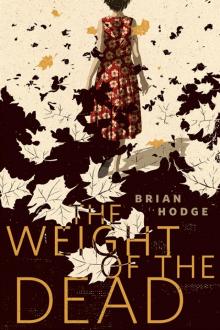 The Weight of the Dead
The Weight of the Dead Lies & Ugliness
Lies & Ugliness The Convulsion Factory
The Convulsion Factory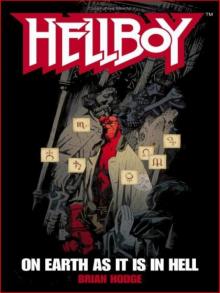 Hellboy: On Earth as It Is in Hell
Hellboy: On Earth as It Is in Hell Whom the Gods Would Destroy
Whom the Gods Would Destroy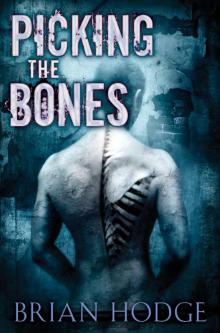 Picking the Bones
Picking the Bones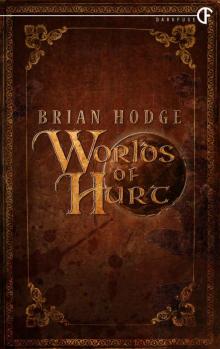 Worlds of Hurt
Worlds of Hurt Oasis
Oasis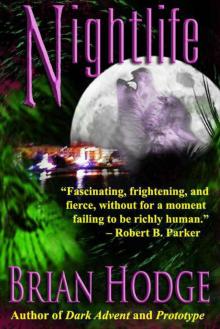 Nightlife
Nightlife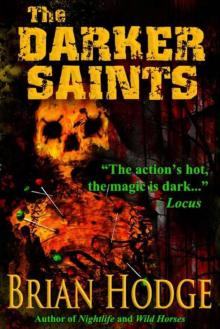 The Darker Saints
The Darker Saints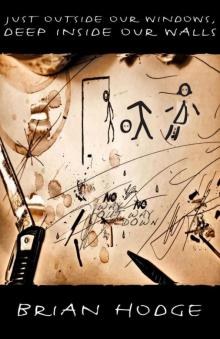 Just Outside Our Windows, Deep Inside Our Walls
Just Outside Our Windows, Deep Inside Our Walls A Haunting of Horrors, Volume 2: A Twenty-Book eBook Bundle of Horror and the Occult
A Haunting of Horrors, Volume 2: A Twenty-Book eBook Bundle of Horror and the Occult Dark Advent
Dark Advent Mad Dogs
Mad Dogs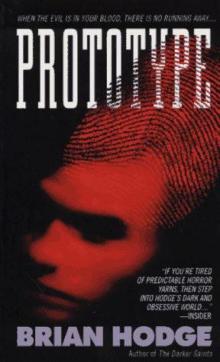 Prototype
Prototype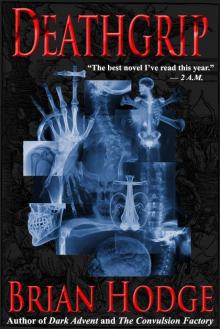 Deathgrip
Deathgrip Falling Idols
Falling Idols